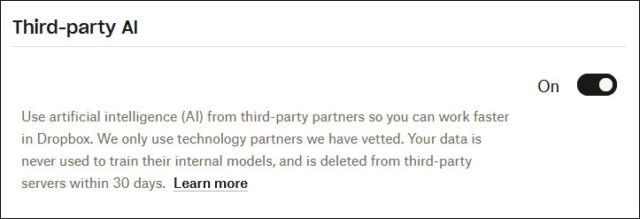adventures in data consent —
AI feature turned on by default worries users; Dropbox responds to concerns.
Benj Edwards – Updated

On Wednesday, news quickly spread on social media about a new enabled-by-default Dropbox setting that shares Dropbox data with OpenAI for an experimental AI-powered search feature, but Dropbox says data is only shared if the feature is actively being used. Dropbox says that user data shared with third-party AI partners isn’t used to train AI models and is deleted within 30 days.
Even with assurances of data privacy laid out by Dropbox on an AI privacy FAQ page, the discovery that the setting had been enabled by default upset some Dropbox users. The setting was first noticed by writer Winifred Burton, who shared information about the Third-party AI setting through Bluesky on Tuesday, and frequent AI critic Karla Ortiz shared more information about it on X.
Wednesday afternoon, Drew Houston, the CEO of Dropbox, apologized for customer confusion in a post on X and wrote, “The third-party AI toggle in the settings menu enables or disables access to DBX AI features and functionality. Neither this nor any other setting automatically or passively sends any Dropbox customer data to a third-party AI service.“
Critics say that communication about the change could have been clearer. AI researcher Simon Willison wrote, “Great example here of how careful companies need to be in clearly communicating what’s going on with AI access to personal data.”

Enlarge / A screenshot of Dropbox’s third-party AI feature switch.
Benj Edwards
So why would Dropbox ever send user data to OpenAI anyway? In July, the company announced an AI-powered feature called Dash that allows AI models to perform universal searches across platforms like Google Workspace and Microsoft Outlook.
According to the Dropbox privacy FAQ, the third-party AI opt-out setting is part of the “Dropbox AI alpha,” which is a conversational interface for exploring file contents that involves chatting with a ChatGPT-style bot using an “Ask something about this file” feature. To make it work, an AI language model similar to the one that powers ChatGPT (like GPT-4) needs access to your files.
According to the FAQ, the third-party AI toggle in your account settings is turned on by default if “you or your team” are participating in the Dropbox AI alpha. Still, multiple Ars Technica staff who had no knowledge of the Dropbox AI alpha found the setting enabled by default when they checked.
In a statement to Ars Technica, a Dropbox representative said, “The third-party AI toggle is only turned on to give all eligible customers the opportunity to view our new AI features and functionality, like Dropbox AI. It does not enable customers to use these features without notice. Any features that use third-party AI offer disclosure of third-party use, and link to settings that they can manage. Only after a customer sees the third-party AI transparency banner and chooses to proceed with asking a question about a file, will that file be sent to a third-party to generate answers. Our customers are still in control of when and how they use these features.”
Right now, the only third-party AI provider for Dropbox is OpenAI, writes Dropbox in the FAQ. “Open AI is an artificial intelligence research organization that develops cutting-edge language models and advanced AI technologies. Your data is never used to train their internal models, and is deleted from OpenAI’s servers within 30 days.” It also says, “Only the content relevant to an explicit request or command is sent to our third-party AI partners to generate an answer, summary, or transcript.”
Disabling the feature is easy if you prefer not to use Dropbox AI features. Log into your Dropbox account on a desktop web browser, then click your profile photo > Settings > Third-party AI. This link may take you to that page more quickly. On that page, click the switch beside “Use artificial intelligence (AI) from third-party partners so you can work faster in Dropbox” to toggle it into the “Off” position.
This story was updated on December 13, 2023, at 5: 35 pm ET with clarifications about when and how Dropbox shares data with OpenAI, as well as statements from Dropbox reps and its CEO.